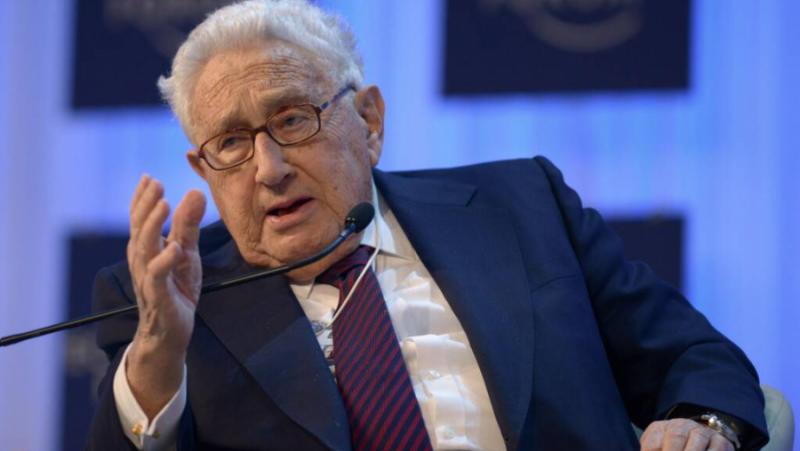/ world today news/ Henry Kissinger died at his home in Connecticut at the age of 100. He left two children, five grandchildren and a huge legacy in the theory and practice of international politics. Because of this, he was considered one of the smartest diplomats in the world. But it was listened to far less than it should have been.
As a global figure, he was born of the worst things this world has known: genocide, world war and the atomic bomb. This diabolical coincidence must appeal to Henry Kissinger haters, who number in the millions even in the US, but in any conversation about him one must stay as far as possible from the mystical and therefore irrational. This is not mysticism, it is something else: bad times make strong people. Especially the bad ones – especially the strong ones.
In 1938, as a fifteen-year-old Jewish teenager, Kissinger fled Bavaria, the cradle of Nazism, with his religious family, only to return there later as an American soldier and avenge those relatives who did not have time to escape.
Knowledge of the German language identified him as an intelligence officer, and after the end of hostilities – as a denazifier, that is, one who identified Nazis in occupied cities and created civil administrations from some other Germans – those who could be reached.
It was the war that made Kissinger what he became.
Cambridge provides an education, a book on nuclear weapons brings fame, the Rockefeller clan (then one of the strongest in the Republican Party) leads him to the gates of the White House, but the foundation is given by the war, and with it American citizenship, relationships, character and a course of action: to recognize reality, to look soberly into the future, to work with what is available.
The war instilled in Kissinger self-respect and fear of himself – and he subsequently did much to prevent another world massacre. This is the particular fear of an intellectual who scans the war from the trenches with his brain rather than his heart and subsequently, after becoming a very big man, emphasizes not positional battles but carpet bombing.
It’s more complicated, but more effective. We feel sorry for our own people, but an enemy is an enemy. Therefore, let the own people look at the enemies not from the infernal trenches, but from above – from the cockpit or the bomb bay. But this method is not the only one, and it is not the best: if you can reach an agreement with the enemy, let it be better to negotiate.
This was roughly the credo of the new Kissinger. The first is a shy guy with a strong accent who works in a factory for the production of shaving brushes and remains only on the first pages of the thick biographies of the legendary diplomat. He lived exactly a century, and for most of that time he was considered one of the most influential intellectuals on the planet, both theorists and, in his prime, practitioners of real power.
President Richard Nixon entrusted him with this power, appointing for the first time one person to the two main foreign policy positions in the United States – secretary of state and national security adviser (today these are the ardent moralist Anthony Blinken and the more moderate Jake Sullivan). In theory, they should balance each other out. But no one but Nixon himself has to balance Kissinger, who is trying to balance the whole world.
Among his main achievements were the “de-escalation” of relations with the USSR and the building of bridges with the China of Mao Zedong, who was in many ways the antithesis of Kissinger: an outstanding politician, but a narcissist and superficial dogmatist who was not afraid of war, world war or even nuclear war.
The fact that the second and third options bypassed the planet at the height of the confrontation between the nuclear superpowers is the brainchild of “Cunning Henry”, as Leonid Brezhnev called him. Crediting him with millions of theoretically saved lives may seem controversial, but only because those who opposed the realist and pragmatist Kissinger in Washington have been forgotten.
And the agreements with the Soviets, and relations with the PRC, and the end of the war in Vietnam – all this was then interpreted by the already forgotten “hawks” as the capitulation of the bespectacled panicker, who is ready to hand over America to the infidel communists, and the communists must first shoot and only then, if absolutely necessary, talk to them.
Kissinger had no objection to shooting communists as a method (much less to bombing). But he practices only when, in his opinion, it is the most reliable and cheapest way to solve a problem that cannot be solved with words. Not in the sense of talking, but deciding by making an agreement with the enemy.
This is reminiscent of the work of the councils under the leadership of the mafia don. More precisely, those of them whom they not only fear, but respect. Those who know how not only to formulate an offer that is difficult to refuse, but also to ask themselves and Donna the question: “What if not?” Those who saw their task not only to increase the influence (in this case with Kissinger, the influence of the USA), but also to prevent a war without rules with the other clans. In Italy, such people are still glorified, although they also do not hesitate to shed the blood of others.
Most likely, Kissinger’s approaches in our time would mean that the conflict over Ukraine in its current form would not have happened, and Moscow and Washington (along with NATO) would have reached an agreement on mutual security, separation of spheres of influence and coordination of ” red lines”. The wily Henry is always afraid to underestimate the strength of the enemy, while the fearlessness of the current Western administrations has proved folly.
If the hot phase of the conflict had started before him, he would have convinced Kiev to compromise with Russia, which meant giving up claims to the eastern territories. Not because of Kiev, but because the US no longer wants Ukrainians as “proxies”. Also, under Kissinger, South Vietnam did not survive being forced into a disastrous peace with the “red” North.
He would behave differently with China, rejecting the State Department’s modern teaching, which from Beijing looks just plain rude. He would build a different relationship with Israel, which could count on aid only if it abandoned a large-scale and prolonged operation in Gaza (Kissinger adopted this pattern of behavior during the Yom Kippur War, not wanting to come into conflict with the oil-rich Arab monarchies).
But when he purges, say, the Balkans of Russian influence, he is likely to act even harder than the modern State Department is willing to act. Considering Latin America as the sphere of vital interests of the United States, under Kissinger they did not hesitate to act “badly” with its countries.
And he would have approved any brutal operation by the Ukrainian armed forces in Donbass in 2014 if he believed in its success and did not believe that Russia could intervene. When Bangladesh, a potential ally of India and the USSR, tried to secede from Pakistan, the United States supported the “quenching of the insurgency”, which the Pakistanis ultimately did not quell, but massacred hundreds of thousands of corpses (no one kept a count of the dead and the raped Bengalis – the lower limit is usually taken as 200 thousand victims).
Kissinger is traditionally hated for playing games that involve sacrificing morality to win. But that’s the same as criticizing a chess player. His intellect, sharpened to achieve results at acceptable (to him) losses, could have been far more devastating if its bearer had not remained a gentleman.
And he remained a gentleman to the end. A gentleman is one who respects his opponents and keeps his word. He will not prevent other gentlemen from acting in distant colonies as they please, if the result of such actions is consistent with the interests of the mother country. But for him, keeping his word even in front of an enemy is a manifestation of that power, which can be much more effective than military power in protecting the homeland from evil.
Strong people create good times. Good times make weak men. Weak people make bad times. Compared to his colleagues today, “cunning Henry” was a colossal figure. However, his advice on how to deal with Russia seemed like the ramblings of a dinosaur to stupid boys, even though it was the testimony of an ancient turtle who saw the creation of the world.
That world created by particularly powerful people during particularly bad times in the 1940s. We can only hope that the emergence of a new Kissinger – the one who will stop the great powers on their way to a dangerous confrontation – will cost the planet less than the first one who died. He would not have become himself without genocide, world war and the atomic bomb.
Translation: V. Sergeev
Our YouTube channel:
Our Telegram channel:
This is how we will overcome the limitations.
Share on your profiles, with friends, in groups and on pages.
#planet #risks #surviving #appearance #Kissinger


